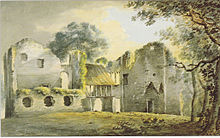John Pole, 1st Baronet
Sir John Pole, 1st Baronet (around 1589 - April 16, 1658 in Bromley-by-Bow ) was an English nobleman and politician who was once elected as a member of the House of Commons .
origin
John Pole came from the Pole family, a Gentry family from Devon . He was the second, but eldest surviving son of Sir William Pole and his wife Mary Peryam . In 1606 he briefly studied at the Inner Temple in London. At the beginning of the 17th century, the Pole family was strongly puritanical . After Pole had married his stepsister Elizabeth How (also Howe ) († 1628) on January 5, 1614 , his father gave him Shute House as his residence.
Political activity during the reign of Charles I.
Without having previously held public offices, Pole was surprisingly elected as the successor of his brother-in-law Francis Courtenay as Knight of the Shire for Devon in the general election in 1626 . In the House of Commons , Pole initially remained cautious until, after three months, on May 9th, he proposed that MPs should take an oath before the impeachment proceedings against the Duke of Buckingham , according to which they would decide impartially and that they would not be bribed were. Although Buckingsham's supporters as well as his opponents immediately supported the proposal, the idea was not implemented until the dissolution of parliament on June 15. In the following elections, Pole did not run again, but he subsequently took over numerous local offices in Devon. In 1627 he was appointed justice of the peace and on September 12, 1628, while his father was still alive, he was raised to the baronet of Shute House in the County of Devon in the Baronetage of England . Before 1633 he became a lieutenant colonel in the militia . After his father's death in 1636, he inherited the family estates. From 1638 to 1639 he served as the sheriff of Devon. In this position he levied the tax called Ship Money for the government , although he himself refused to levy the tax. Before 1639 he had also become Deputy Lieutenant of Devon, which is why he had to recruit soldiers for the Episcopal Wars. However, he himself refused to pay a voluntary contribution to finance the wars. In 1640 he achieved that the Borough Honiton in Devon was allowed to send MPs to the House of Commons. As a result, his eldest son William was elected as one of Honiton’s two MPs in the November 1640 general election.
Participation in the English Civil War
When the English Civil War broke out in 1642 , Pole supported Parliament against the king. As a result, he lost his offices as justice of the peace and deputy lieutenant. He put in Devon with a contingent of troops for the Parliament, while his two eldest sons William and Courtenay joined the royal troops. In 1643 he commanded two advances by parliamentary troops into the areas of Devon and Cornwall , held by supporters of the king. In the same year he was also one of the members of parliament who led unsuccessful peace negotiations with the supporters of the king in Devon. During the Civil War, the family estates Colcombe Castle and Shute House were severely damaged by royal and parliamentary troops, respectively. With the advance of royal troops, Pole had to retreat to Bromley-by-Bow, east of London, before July 1644 , where his second wife, Mary Leachland, owned a house. After the civil war in 1646 was decided in favor of parliament, Pole took over the office of justice of the peace and other offices. However , he refused the execution of King Charles I in early 1649, so that he retired politically during the Commonwealth and held no offices until his death.
Others
After the Civil War, Pole acquired extensive estates in County Meath , Ireland , but otherwise during the Commonwealth he left the administration of his estates mostly to his son Courtenay Pole. He himself probably lived in seclusion in Bromley-by-Bow until his death. Like his father, he was very interested in local Devonian history, but his writings were never published. He was buried on July 13, 1658 in the Pole Chapel of St Andrew Church in Colyton .
Family and offspring
From his marriage to Elizabeth How († 1628), a daughter of the London merchant Roger How (also Howe ), Pole had three sons and four daughters, including
- Martha Pole
- Jane Pole
- Sir William Pole (1614-1649)
- Sir Courtenay Pole , 2nd Baronet (1619–1695)
After the death of his first wife in 1628, he married Mary, the widow of William Leachland of Bromley-by-Bow. The marriage remained childless. After his eldest son William died in 1649 without male heirs, his second eldest son Courtenay Pole became his heir.
Web links
- Tim Venning, Paul Hunneyball: POLE, John (c.1589-1658), of Shute, Devon; later of Colcombe Castle, Colyton, Devon and Bromley-by-Bow, Mdx. (History of Parliament Online, Ref Volumes: 1604–1629)
- Sir John Pole, 1st Bt. On thepeerage.com , accessed November 5, 2017.
| predecessor | Office | successor |
|---|---|---|
| New title created | Pole Baronet, of Shute House 1628–1658 |
Courtenay Pole |
| personal data | |
|---|---|
| SURNAME | Pole, John, 1st Baronet |
| ALTERNATIVE NAMES | Pole, Sir John, 1st Baronet (full name) |
| BRIEF DESCRIPTION | English nobleman and politician |
| DATE OF BIRTH | before 1589 |
| DATE OF DEATH | around April 16, 1658 |
